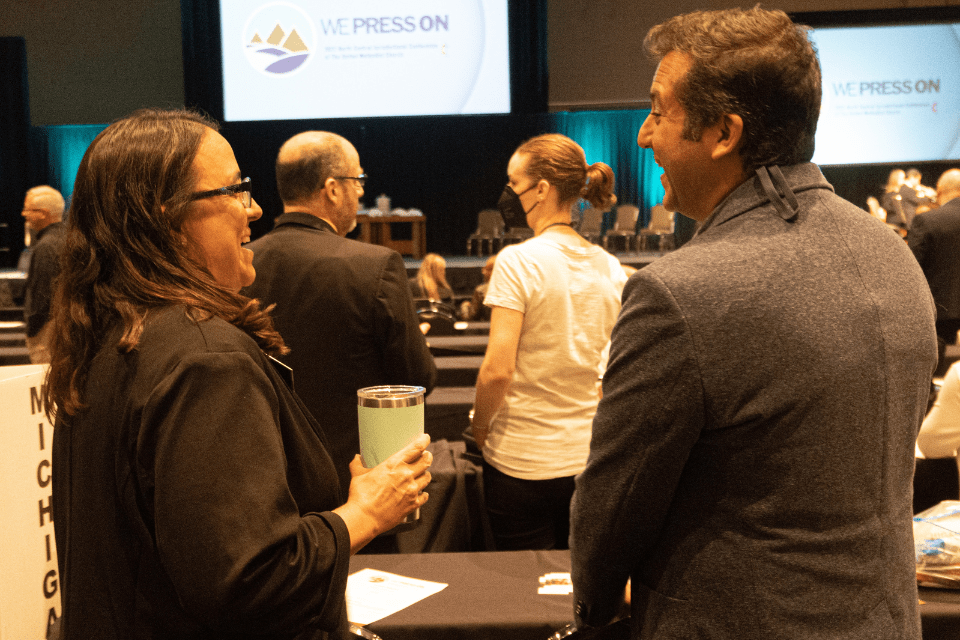The Rev. Paul Perez, clergy delegate, lists three important takeaways from last week’s North Central Jurisdictional Conference that every Michigan United Methodist should pay attention to.
PAUL PEREZ
Director of Connectional Ministry, Michigan Conference
Last week, I served as a delegate to the North Central Jurisdiction Conference of The United Methodist Church. Here are my three biggest takeaways.
1. Grappling with religious disaffiliation is just as important as grappling with denominational disaffiliation.
Bishop Bard, in his soaring Episcopal Address, dropped this insight, citing “Modeling the Future of Religion in America,” a recent report from Pew Research Center. Over the past three decades, according to the report, a substantial number of Americans have left Christianity to join the steadily increasing number of adults in the U.S. who identify as atheist, agnostic, or “nothing in particular.” The report projects that the number of Christians in the U.S. will shrink by just over a half to as little as one-third of the U.S. population by 2070.
Many of those “disaffiliating” Christians who identify with “nothing in particular” continue to hold a curiosity about God, search for meaning and purpose in their lives, desire “capacious” and “magnanimous” community, and are attracted to adventurous practices of faith and life.
In order to engage with this group of “disaffiliated” Christians and United Methodists, I am convinced it will take a refocusing on, a reinvention of, and reinvestment in our faith formation practices with young people and their families. I am also convinced it will require creative new ministries – like those in the Fresh Expressions movement and being developed by our Conference’s Seed to Harvest ministry incubation initiative.
I left the NCJ Conference asking, “What would it mean for our denominational structures to spend just as much time, energy, and resources on those disaffiliating from Christianity as it is currently focusing on those disaffiliating from the denomination?”
2. Regionalization is crucial for the future of The United Methodist Church around the world.
The NCJ, along with the four other jurisdictions, passed a resolution entitled “Supporting Formation of A U.S. Regional Conference,” to support the Christmas Covenant and the Connectional Table’s General Conference legislation to create a U.S. Regional Conference.
Currently, The UMC has seven Central Conferences in regions outside the U.S. and five jurisdictions in regions within the U.S. Central Conferences have the ability to adjust and contextualize the Book of Discipline for their ministry contexts and missional needs. The jurisdictions do not. Major decisions that only impact United Methodists in the U.S. are made at General Conference, taking up valuable space and time to consider issues and decisions that impact the United Methodists around the world. The above legislation seeks to change this by “regionalizing” denominational structures.
I am an ardent supporter of both the Christmas Covenant and the Connectional Table’s legislation. The United Methodist Church has grown considerably around the world. It is past time to change our U.S.-centric denominational structures and become a denomination balancing worldwide unity and regional self-determination. Giving United Methodists in the U.S. their own space to wrestle with issues particular to their context would open the possibility for The United Methodist Church as a whole to focus its worldwide attention on how the gospel is being heard and shared anew in different contexts and how the church might focus on global and planetary issues of climate change, poverty, health, and human migration.
In 2024, the General Conference will have a historic opportunity to move The UMC into the next chapter of its shared life as a worldwide church.
3. We took important steps forward in The UMC’s ministry with, by, and for LGBTQIA+ people.
The three bishops elected by the NCJ—Kennetha Bigham-Tsai, Lanette Plambeck, and Dan Schwerin—are all committed to the full inclusion of LGBTQIA+ people in the church and to holding charges and complaints related to sexual orientation, gender identity, and officiating same-gender weddings in abeyance until, hopefully, the General Conference changes the Book of Discipline and officially removes the discriminatory policies and procedures related to LGBTQIA+ people and their allies.
The other jurisdictions are headed in the same direction, electing bishops with the same commitments. The Western Jurisdiction elected Cedrick Bridgeforth, the first Black, openly gay, married bishop.
The NCJ, along with the four other jurisdictions, passed a resolution entitled “Queer Delegates’ Call to Center Justice and Empowerment for LGBTQIA+ People in The UMC.” Queer delegates from across the jurisdictions authored it, and it calls on bishops and conferences to abeyance or moratorium on charges and complaints related to sexual orientation and officiating same-gender weddings. It also “commits to a future of The United Methodist Church where LGBTQIA+ people will be protected, affirmed, and empowered in the life and ministry of the church in our Jurisdiction, including as laity, ordained clergy, in the episcopacy, and on boards and agencies.”
On Friday of the NCJ Conference, delegates engaged in a ”Conversation to Understand the Impact of Homophobia, Transphobia, and Heterosexism within the UMC.” Three witnesses shared about the harm experienced in The UMC and their tenacious faith in God’s love through Jesus Christ.
I believe LGBTQIA+ United Methodists have a unique and grace-filled vision of the gospel to offer our churches and our denomination for such a time as this. I dream of a church that not only includes LGBTQIA+ people in the “church that is” but is also led and transformed by LGBTQIA+ people to become “the church that is yet to be.”
Finally, I want to offer a word of gratitude to our Michigan Conference delegation. When we were elected in 2019, none of us imagined we would wait over three years to attend an NCJ Conference and still be waiting to attend a General Conference. I am thankful for their commitment and dedication to creating a just, compassionate, and inclusive United Methodist Church.
Last Updated on November 15, 2022

